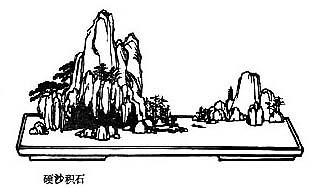Sun Zi 
 – The Art of War
– The Art of War
Chinese strategy explained : know yourself and the ennemy, use deception, spies, and "win with ease". Tr. Giles (en, annotated) and Amiot (fr).
Tactical Dispositions
Ts`ao Kung explains the Chinese meaning of the words for the title of this chapter: "marching and countermarching on the part of the two armies with a view to discovering each other's condition." Tu Mu says: "It is through the dispositions of an army that its condition may be discovered. Conceal your dispositions, and your condition will remain secret, which leads to victory,; show your dispositions, and your condition will become patent, which leads to defeat." Wang Hsi remarks that the good general can "secure success by modifying his tactics to meet those of the enemy."
Sunzi IV. 10.
Hence his victories bring him neither reputation for wisdom nor credit for courage.1
He wins his battles by making no mistakes.2 Making no mistakes is what establishes the certainty of victory, for it means conquering an enemy that is already defeated.
Giles IV.12,13.
Aussi les victoires remportées par un maître dans l'art de la guerre ne lui rapportaient ni la réputation de sage, ni le mérite d'homme de valeur. Qu'une victoire soit obtenue avant que la situation ne se soit cristallisée, voilà ce que le commun ne comprend pas. C'est pourquoi l'auteur de la prise n'est pas revêtu de quelque réputation de sagacité. Avant que la lame de son glaive ne soit recouverte de sang, État ennemi s'est déjà soumis. Si vous subjuguez votre ennemi sans livrer combat, ne vous estimez pas homme de valeur. Tels étaient nos Anciens : rien ne leur était plus aisé que de vaincre ; aussi ne croyaient-ils pas que les vains titres de vaillants, de héros, d'invincibles fussent un tribut d'éloges qu'ils eussent mérité. Ils n'attribuaient leur succès qu'au soin extrême qu'ils avaient eu d'éviter jusqu'à la plus petite faute. Éviter jusqu'à la plus petite faute veut dire que, quoiqu'il fasse, il s'assure la victoire ; il conquiert un ennemi qui a déjà subi la défaite ; dans les plans jamais un déplacement inutile, dans la stratégie jamais un pas de fait en vain.
Amiot

The Art of War – Sun Zi IV. 10. – Chinese off/on – Français/English
Alias Sun Tzu, Sun Wu, Sun Tse, Sunzi Bingfa, Souen Tseu, Souen Wou, 孫武.
The Book of Odes, The Analects, Great Learning, Doctrine of the Mean, Three-characters book, The Book of Changes, The Way and its Power, 300 Tang Poems, The Art of War, Thirty-Six Strategies
Welcome, help, notes, introduction, table.
Index – Contact – Top
